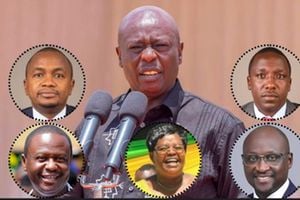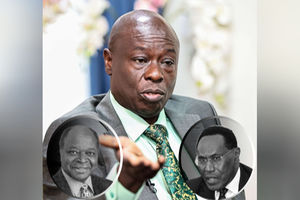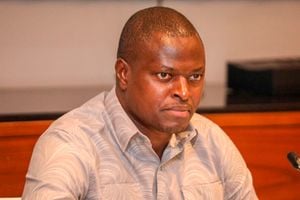
Deputy President Rigathi Gachagua addresses the faithful at the Sacred Heart Catholic Church in Endarasha, Nyeri County, on May 19, 2024.
The proposed ouster from office of Deputy President Rigathi Gachagua has once again revived concerns around the reconstitution of the electoral agency.
While the law imposes mandatory thresholds for consideration of an impeachment motion, the calculations are based on total House membership (349) but four seats are vacant.
House Speaker Moses Wetang'ula had to rule that the base figure of 349 still applies to calculate the one third (117) needed to introduce the motion and two thirds (233) required for it to pass to the Senate.
The special motion is sponsored by Kibwezi West Mwengi Mutuse.
Mbeere South Geoffrey Ruku had sought to exploit the dysfunctional Independence Electoral and Boundaries Commission (IEBC) that has delayed by-elections in Ugunja, Magarini and Banisa constituencies as well as fill a vacant ODM nominated MP slot.
As a result, he raised fundamental legal questions, noting that this could create an avenue to challenge the validity of the impeachment motion, if it sails through the National Assembly.
He invited Wetang’ula to rule on the matter in terms of the threshold of members to sign up the impeachment motion and on the final vote.
The DP will have to raise over 117 members to scuttle his impeachment in the National Assembly or face the senate trial if the mover of the motion secures over 233 votes in the House. The mover garnered 291 signatures to introduce the motion in the National Assembly.
Mr Ruku, a Democratic Party (DP) member, argued that four seats in the House are vacant following the resignation of Opiyo Wandayi as Ugunja MP and John Mbadi as nominated MP upon being appointed as CSs in the Energy and Petroleum and the National Treasury and Planning dockets, respectively.
“Further, as you are aware, the seat of Magarini was declared vacant following a successful election petition and the Banisa constituency seat was declared vacant following the unfortunate demise of our colleague,” said Mr Ruko in reference to Harrison Kombe, ex- Magarini MP and the late Kullow Hassan.
“We are now 345 members. Is this right, what threshold shall you use to determine whether the special motion meets the constitutional threshold to pass this motion, shall we require two thirds of 345 or 349 members,”
With the House less four members, the first time MP sought to know if it has any direct bearing in terms of the numbers in the House.
Although, the IEBC (Amendment) law, which was part of the nine pieces of legislations agreed upon in the National Dialogue Committee (Nadco) report chaired by National Assembly Majority Leader Kimani Ichung’wah and Wiper Leader Kalonzo Musyoka, setting up the selection panel is in place, the process have faced legal challenges.
This has delayed the constitution of the panel to hit the ground running to conduct the pending by-elections at the constituencies and the ward levels, as well as the time barred boundaries delimitation.
Speaker Wetang’ula clarified on the calculation of the number of members required to meet the voting thresholds that apply to the impeachment of a DP.
“In this regard, a member who proposes a motion for impeachment of a president or deputy president must be supported by at least one third of the 349 members of the House, being 117 members,” stated the Speaker, in response to Mr Ruku’s concerns that there are only 345 members and therefore the thresholds should have been calculated based on the number and its 349.
Mr Wetang’ula argued, “Members will note the instructive words in both provisions subject to prescribed thresholds to ‘all the members’. To the extend that no reference is made to ‘existing’ members, the thresholds can only be applied to the membership of the National Assembly that is prescribed under Article 97 of the constitution.”
Article 97 of the constitution provides: “The National Assembly consists of two hundred and ninety members, each elected by the registered voters of single member constituencies, forty-seven women, each elected by the registered voters of the counties, each county constituting a single member constituency, twelve members nominated by parliamentary political parties according to their proportion of members of the National Assembly in accordance with Article 90, to represent special interests including the youth, persons with disabilities and workers and the Speaker, who is an ex officio member.”
He also weighed in on the concerns around the validity of the proceedings of the House, if it would be affected in light of the four vacant seats.
“Notably, Article 124(3) of the constitution provides that the proceedings of a House of Parliament are not invalid merely on account of a vacancy in its membership.”
The matter featured in the National Assembly as the country grappled with the formation of the selection panel after a fresh legal challenge was lodged against the Political Parties Disputes Tribunal's ruling.
The Azimio la Umoja One Kenya coalition and Ambassador Koki Muli filed an appeal last month against the tribunal's ruling that appointed Augustus Kyalo Muli as their nominee.
The tribunal had earlier named Mr Kyalo Muli as the legitimate representative of small political parties on the IEBC selection panel.
However, Ms Muli contested the ruling, filing a case that was mentioned on September 26, before Lady Justice Janet Mulwa.
Mr Muli announced that his party, the National Liberal Party, along with 15 other small parties, plans to withdraw from the Azimio.
The IEBC has been without a full panel for over two months, following President William Ruto's signing of the IEBC Bill, and the dissolution of the previous panel.
Speaker Wetang’ula has in the past called for the swift reconstitution of the IEBC and appealed to the warring parties to reconsider their positions for the sake of national unity.
He underscored the urgency of addressing the IEBC issue as there were many pending commission activities which had stalled due to a lack of commissioners.
He also urged the Chief Justice Martha Koome to expedite court cases concerning the IEBC.











